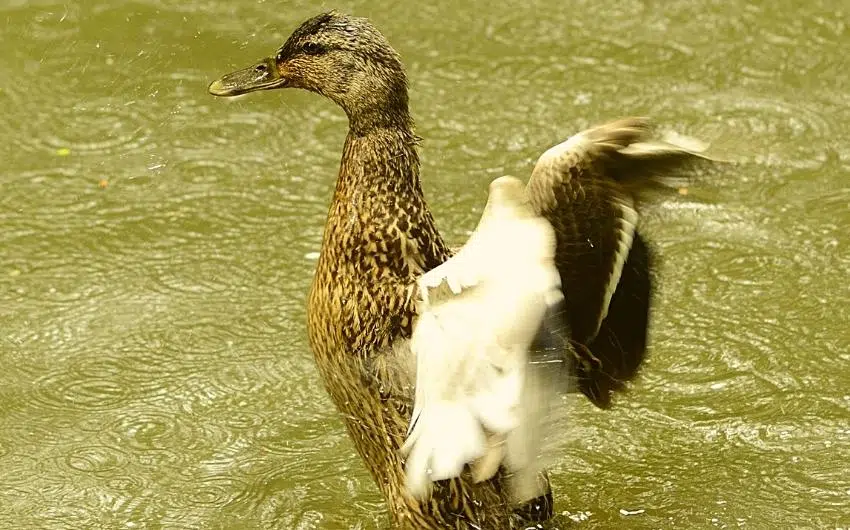Ducks are some of the most popular game birds in North America for a good reason. They’re challenging to hunt, they taste delicious, and they’re just plain fun to watch. But where do ducks go when it rains?
Ducks are disappearing! It’s been scientifically proven that ducks prefer to go somewhere when it rains. But where do ducks go when it rains?
And how can you take advantage of that knowledge to improve your hunting success?
Keep reading for some epic tips on duck hunting during bad weather.
Quick Jump
ToggleWhat Does a Duck Do When It Rains?
Ducks often preen their feathers when it rains and pokes around in puddles. Ducks have special oils in their feathers that help repel water, so when they preen, they are helping to keep themselves dry.
Ducks also enjoy playing in puddles, which helps them stay clean too! When it rains, ducks will often swim in puddles and splash around.
This is an excellent time for many duck hunters to hunt them because they’re easier to spot and ignore their surroundings.
So, the next time it rains, don’t despair – get out there and start hunting! With these tips, you’re sure to have a successful hunt.
Where Do Ducks Go When It Rains?
Where Do Ducks Go in a Storm? The ducks are smart enough to know it’s time to find a safe place. They head towards protected areas like rivers and lakes where they’ll be out of the rainstorm Center Stage: The Watering Place!
Researchers found that ducks congregate in the center of large water bodies in storms, where they’re less likely to be blown away or hit by flying debris.
So, if you’re hunting in a large lake or river, keep an eye out for ducks in the middle of the water, where they’re likely to be.
Do Ducks Like Rain Storms?
Do Ducks Like the Rain? Who doesn’t love a good rainstorm? Ducks are no exception. They love rain. Plus, it gives them a perfect opportunity to take a nice cleansing bath. It’s a win-win for everyone!
Knowing where ducks go when it rains, you can take advantage of the situation and improve your hunting success. With these tips, you’re sure to have a great time – rain or shine!
Where Do Birds Go When It Rains?
Generally, birds seek shelter from the wind and rain in dense shrubs or thickets. They may also roost next to large trees or buildings.
You may see a bird huddled under a roof overhang or on a wire if you’re lucky. Some birds, like the American robin, will even come to your backyard during a storm looking for shelter!
Can Ducks Stay Out in the Cold Rain?
Do Ducks Get Cold? Ducks can handle a range of temperatures from -20 up, but when it gets too low, they start to suffer frostbite on their feet which could lead them to lose one or more toes.
Ducks can withstand cold temperatures and heavy rains, but they will seek shelter if they can find it.
If you’re hunting in cold, wet weather, dress warmly and waterproof yourself from head to toe. Ducks may be challenging, but you’re not made of feathers!
Tips for Duck Hunting in the Rain
- Look for ducks in the middle of large bodies of water.
- Check out for ducks huddled under tree branches or on wire fences.
- Dress warmly and waterproof yourself from head to toe.
- Bring a blind or tarp to set up near your hunting spot.
- Be patient and wait for the ducks to come to you.
- Use decoys to attract ducks to your hunting spot.
- Be quiet and move slowly to avoid spooking the ducks.
- Be prepared to get wet and dirty.
- Have fun and enjoy the hunt!
Do Ducks Need Shelter from Rain?
Be sure to provide your ducks with a place of shelter from the rain, just in case they become chilly or want some time off. A shed, doghouse, or even an upturned box can work well.
If you don’t have anything to provide for shelter, don’t worry – ducks are resilient creatures and can usually find something to huddle under on their own. But it’s always nice to give them a helping hand!
How Can You Take Advantage of This Knowledge?
Knowing where ducks go when it rains you can use this knowledge to improve your hunting success.
- First, if you’re planning on hunting in wet weather, dress appropriately. Wear waterproof clothing and boots, and bring a raincoat or poncho to stay dry.
- Next, head to the areas where ducks are likely to be in wet weather – rivers, lakes, and other large bodies of water. Look for ducks in the middle of the water, as they’re less likely to be blown away or hit by flying debris.
- Finally, remember that ducks are more visible in wet weather, so take advantage of this and use a scope or binoculars to better look at them. With these tips, you’re sure to have a successful hunt in the bad weather.
Commonly Asked Questions about Ducks in the Rain (FAQ)
What Is the Most Common Type of Ducks?
The most common type of duck is the mallard. Mallards are a species of dabbling duck, which means they feed by tipping their heads under the water to reach food on the bottom.
Mallards are native to North America but have also been introduced to other parts of the world, including Europe and Australia.
Where Do Ducks Go at Night?
At night, ducks typically roost in areas that offer shelter from the wind and predators. This may be in a marshy area with tall grasses, a forest with dense trees, or near a body of water.
Ducks will often roost in the same area every night, so if you find a good spot, you may be able to return and find them there again.
Where Do Ducks Go in the winter?
In the winter, ducks will migrate to areas with milder climates. This may be to a different part of the country or even to a different continent. Migration typically begins in late fall and continues into early winter.
Do Ducks Like Thunderstorms?
Ducks don’t seem to mind thunderstorms and will often continue to swim and feed in the rain. However, if the storm is too severe, they may seek shelter to avoid being blown away or hit by flying debris.
Where Do Birds Go When They Die?
They may choose to rest in the safety of their burrow or some other secure place. When birds die, their bodies are typically taken by scavengers such as vultures, gulls, or other birds of prey.
If the scavengers can’t get to the body, it will eventually decompose and be taken back into the earth.
Do Ducks Fly in the Rain?
Yes, ducks do fly in the rain and Thunderstorms. They are perfect flyers and have strong muscles that help them stay in the air. Ducks also have a layer of waterproof feathers that keep them dry and comfortable while flying. So if you see a duck flying on rainy days, don’t be surprised!
What Is a Male Duck Called?
A male duck is called a drake. Male ducks have different plumage than females and are often more brightly colored.
Conclusion
Where do ducks go when it rains? So there you have it. Ducks go where they please, including some exciting places when the rain starts pouring. Who would have thought? Now that we know a bit more about ducks and their behavior, the next time it rains, keep an eye out for these feathered friends – you may see them hopping around your neighborhood!
You might also like:
- What Is The Best Shotgun Sight For Duck Hunting? (Top Picks)
- Argentina Duck Hunting – Season, Limits, Outfitters & (More)
- When Should A Hunter Wear A Fall Arrest System? (Solved)
- What Is The Hunters Role In Wildlife Conservation?
- Here’s Why Do Hunters Pattern Their Shotguns & How?
- What Are The Four Main Causes Of Hunting Incidents?
- What Should You Check Before Choosing A Firearm For Hunting?
- How Do Game Conservation Laws Affect Hunters? – (Revealed!)


